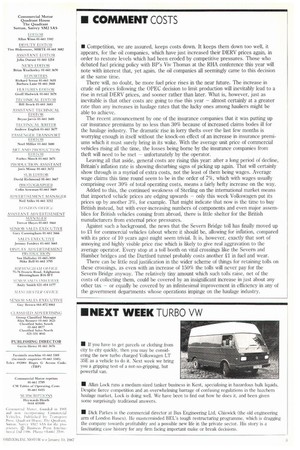I Competition, we are assured, keeps costs down. It keeps
Page 5

If you've noticed an error in this article please click here to report it so we can fix it.
them down too well, it appears, for the oil companies, which have just increased their DERV prices again, in order to restore levels which had been eroded by competitive pressures. Those who debated fuel pricing policy with BP's Viv Thomas at the RHA conference this year will note with interest that, yet again, the oil companies all seemingly came to this decision at the same time.
There will, no doubt, be more fuel price rises in the near future. The increase in crude oil prices following the OPEC decision to limit production will inevitably lead to a rise in retail DERV prices, and sooner rather than later. What is, however, just as inevitable is that other costs are going to rise this year — almost certainly at a greater rate than any increases in haulage rates that the lucky ones among hauliers might be able to achieve.
The recent announcement by one of the insurance companies that it was putting up car insurance premiums by no less than 30% because of increased claims bodes ill for the haulage industry. The dramatic rise in lorry thefts over the last few months is worrying enough in itself without the knock-on effect of an increase in insurance premiums which it must surely bring in its wake. With the average unit price of commercial vehicles rising all the time, the losses being borne by the insurance companies from theft will need to be met — unfortunately by the operator.
Leaving all that aside, general costs are rising this year: after a long period of decline, Britain's inflation rate is showing disturbing signs of picking up again. That will certainly show through in a myriad of extra costs, not the least of them being wages. Average wage claims this time round seem to be in the order of 7%, which with wages usually comprising over 30% of total operating costs, means a fairly hefty increase on the way.
Added to this, the continued weakness of Sterling on the international market means that imported vehicle prices are edging upwards — only this week Volkswagen put its prices up by another 3%, for example. That might indicate that now is the time to buy British instead, but with ever-increasing numbers of components and even major assemblies for British vehicles coming from abroad, there is little shelter for the British manufacturers from external price pressures.
Against such a background, the news that the Severn Bridge toll has finally moved up to £1 for commercial vehicles (about where it should be, allowing for inflation, compared with its price of 10 years ago) might seem trivial. It is, however, exactly that sort of annoying and highly visible price rise which is likely to give real aggravation to the average operator. Every stop at a toll booth on vital crossings like the Severn and Humber bridges and the Dartford tunnel probably costs another £1 in fuel and wear.
There can be little real justification in the wider scheme of things for retaining tolls on these crossings, as even with an increase of 150% the tolls will never pay for the Severn Bridge anyway. The relatively tiny amount which such tolls raise, net of the costs of collecting them, could be covered by an insignificant increase in just about any other tax — or equally be covered by an infinitesimal improvement in efficiency in any of the government departments whose operations impinge on the haulage industry.




































































